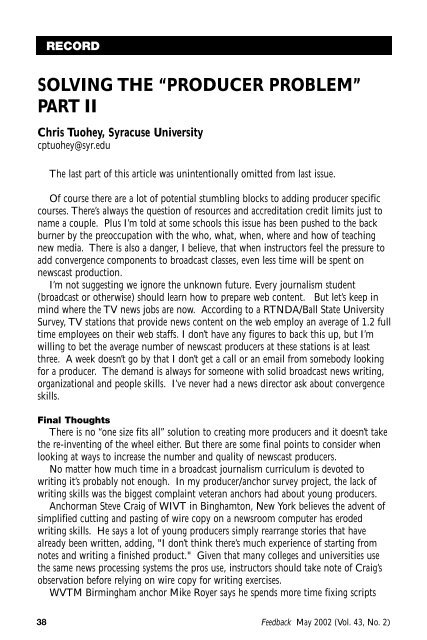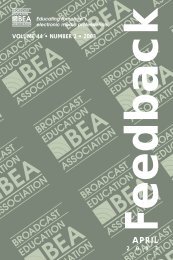Endnotes1“’Clout Titles’ include Chairman, Chief Executive Officer, Vice Chairman, President,Chief Operating Officer, Senior Executive Vice President and Executive Vice-President.Executives with these titles have the highest level of power within an organization”(Jamieson et al., p. 5).2Fox News Channel’s Sharri Berg, Cablevision’s Pat Falese, Disney’s Susan Fox, CBS’sWendi Goldstein, Seachange International’s Yvette Gordon, KCNC-Denver’s AngieKucharski, KPWR-FM and KZLA-FM-Los Angeles’ Val Maki, WPBF-TV-West PalmBeach’s Vicki Regan, and TNN’s Diane Robina, CBS’s Nina Tassler, and ParamountTV’s Terry Wood.3Lutheran Church Missouri Synod v. FCC.4DC/MD/DE Broadcasters Association v. FCC.5“The former rule provided two recruitment options, which were referred to as“Option A” and “Option B.” The Court found no statutory or constitutional infirmitywith Option A. However it found that Option B was unconstitutional. Even thoughthe Court found only Option B unconstitutional, it vacated the Commission’s EEOrules. The Court concluded that the two options could not be readily severed”(Spivack, 2001). The data-collection requirements in Option B were interpreted by thejudges to mean that the FCC could review a broadcaster’s applicant pool and orderchanges in its recruiting if the Commission didn’t feel it was diverse enough. Thecourt felt this “created enough pressure on employers to constitute a de facto, illegalquota” (McConnell, 2001d, p. 27).6(FCC 01-363)7On December 21, 2001, the FCC released the Second <strong>No</strong>tice of Proposed Rule Making(“Second <strong>No</strong>tice”) (FCC 01-363) requesting comments concerning the proposed EEOrules. A summary of the Second <strong>No</strong>tice was published in the Federal Register onJanuary 14, <strong>2002</strong> (67 FR 1704). In mid-February the Commission extended its initialdeadline for comments by 30 days to April 15, <strong>2002</strong>; Reply Comments due <strong>May</strong> 15,<strong>2002</strong> (Mass Media Bureau, <strong>2002</strong>; “Commission Extends,” <strong>2002</strong>).BEA—Educating tomorrow’s electronic media professionals 37
RECORDSOLVING THE “PRODUCER PROBLEM”PART IIChris Tuohey, Syracuse Universitycptuohey@syr.eduThe last part of this article was unintentionally omitted from last issue.Of course there are a lot of potential stumbling blocks to adding producer specificcourses. There’s always the question of resources and accreditation credit limits just toname a couple. Plus I’m told at some schools this issue has been pushed to the backburner by the preoccupation with the who, what, when, where and how of teachingnew media. There is also a danger, I believe, that when instructors feel the pressure toadd convergence components to broadcast classes, even less time will be spent onnewscast production.I’m not suggesting we ignore the unknown future. Every journalism student(broadcast or otherwise) should learn how to prepare web content. But let’s keep inmind where the TV news jobs are now. According to a RTNDA/Ball State UniversitySurvey, TV stations that provide news content on the web employ an average of 1.2 fulltime employees on their web staffs. I don’t have any figures to back this up, but I’mwilling to bet the average number of newscast producers at these stations is at leastthree. A week doesn’t go by that I don’t get a call or an email from somebody lookingfor a producer. The demand is always for someone with solid broadcast news writing,organizational and people skills. I’ve never had a news director ask about convergenceskills.Final ThoughtsThere is no “one size fits all” solution to creating more producers and it doesn’t takethe re-inventing of the wheel either. But there are some final points to consider whenlooking at ways to increase the number and quality of newscast producers.<strong>No</strong> matter how much time in a broadcast journalism curriculum is devoted towriting it’s probably not enough. In my producer/anchor survey project, the lack ofwriting skills was the biggest complaint veteran anchors had about young producers.Anchorman Steve Craig of WIVT in Binghamton, New York believes the advent ofsimplified cutting and pasting of wire copy on a newsroom computer has erodedwriting skills. He says a lot of young producers simply rearrange stories that havealready been written, adding, "I don’t think there’s much experience of starting fromnotes and writing a finished product." Given that many colleges and universities usethe same news processing systems the pros use, instructors should take note of Craig’sobservation before relying on wire copy for writing exercises.WVTM Birmingham anchor Mike Royer says he spends more time fixing scripts38<strong>Feedback</strong> <strong>May</strong> <strong>2002</strong> (<strong>Vol</strong>. <strong>43</strong>, <strong>No</strong>. 2)
- Page 1 and 2: Feedback May 2002 (Vol. 43, No. 2)F
- Page 3 and 4: EditReviews . . . . . . . . . . . .
- Page 5 and 6: Examples of student projects:• Pl
- Page 7 and 8: These teachers will also offer a nu
- Page 9 and 10: The whole project forum will meet t
- Page 11 and 12: An e-mail from a recent graduate wh
- Page 13 and 14: or grip contributes to the overall
- Page 15 and 16: Because much of the satisfaction in
- Page 17 and 18: RECORDMANAGEMENT: AN MBTI CASE STUD
- Page 19 and 20: $500 savings on his car purchase. E
- Page 21 and 22: is the largest and most comprehensi
- Page 23 and 24: The PR major at Central Michigan Un
- Page 25 and 26: FAST FORWARDTHE CONVERGENCE CURRICU
- Page 27 and 28: how to shoot video for our newspape
- Page 29 and 30: it meant overseeing radio commercia
- Page 31 and 32: RECORDTHE PARTICIPATION OF WOMENIN
- Page 33 and 34: On the programming front, in early
- Page 35 and 36: Of these 553 participants, 438 (79.
- Page 37 and 38: Table 4: Percentage of female membe
- Page 39: Kennard, W.E. (1998, September 29).
- Page 43 and 44: PAUSETHE LIFE CYCLE OF AN ADMINISTR
- Page 45 and 46: decision to return to full-time tea
- Page 47 and 48: SEARCHBEA Interest Division Chairs
- Page 49 and 50: SEARCH2002-2003 Leadership Listing
- Page 51 and 52: DISTRICT 7 — All two-year schools
- Page 53 and 54: SEARCHBEA 2002-2003 SCHOLARSHIP WIN
- Page 55 and 56: SEARCHBEA STUDENT NEWS AWARDSby Dan
- Page 57 and 58: Table 3Broadcast Education Associat
- Page 59 and 60: EDITMcLean, Donald F. (2000). Resto
- Page 61 and 62: EDITBeale, M. E., & Murray, M. D. (
- Page 63 and 64: EDITGokhale, Anu. Introduction to T
- Page 65: EDITKeller, Teresa & Hawkins, Steph
















